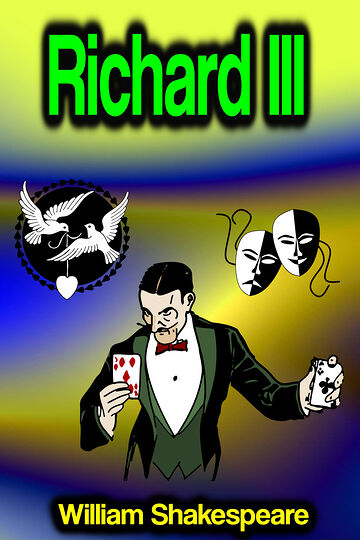- Ebook

Richard III (Tragedy of King Richard the third)
Richard III (Tragedy of King Richard the third) - William Shakespeare - Richard III is a play by William Shakespeare. It was probably written c. 1592–1594. It is labelled a history in the First Folio, and is usually considered one, but it is sometimes called a tragedy, as in the quarto edition. Richard III concludes Shakespeare's first tetralogy (also containing Henry VI, Part 1, Henry VI, Part 2, and Henry VI, Part 3) and depicts the Machiavellian rise to power and subsequent short reign of King Richard III of England. It is the second longest play in the Shakespearean canon and is the longest of the First Folio, whose version of Hamlet, otherwise the longest, is shorter than its quarto counterpart. The play is often abridged for brevity, and peripheral characters removed. In such cases, extra lines are often invented or added from elsewhere to establish the nature of the characters' relationships. A further reason for abridgment is that Shakespeare assumed his audiences' familiarity with his Henry VI plays, frequently referring to these plays. Richard is an ugly hunchback, "rudely stamp'd", "deformed, unfinish'd", cannot "strut before a wanton ambling nymph", and says he is "determined to prove a villain / And hate the idle pleasures of these days." Through a prophecy, that "G of Edward's heirs the murderer shall be", he has contrived to have his brother Clarence conducted to the Tower of London (the king interpreted the prophecy as George of Clarence). Speaking to Clarence en route, Richard blames the queen and says that he will himself try to help Clarence. Lady Anne attends the corpse of Henry VI with Trestle and Berkeley going from St Paul's Cathedral. She bids them set down the "honourable load" then laments. Richard appears, and Lady Anne says that "Henry's wounds [...] bleed afresh". He confesses the murder, and she spits at him. He offers himself to her sword, but she drops it. He offers to kill himself at her order, but she accepts his ring. Richard exults at having won her over so and tells the audience that he will discard her once she has served his purpose. The atmosphere at court is poisonous. The established nobles are at odds with the upwardly mobile relatives of Queen Elizabeth, a hostility fueled by Richard's machinations. Queen Margaret, Henry VI's widow, returns, though banished, and she warns the squabbling nobles about Richard, cursing extensively. The nobles, all Yorkists, unite against this last Lancastrian and ignore the warnings. Richard orders two murderers to kill Clarence in the tower. Clarence relates a distressing dream to his keeper before going to sleep. The murderers arrive with a warrant, and the keeper relinquishes his office. While the murderers are pondering what to do, Clarence wakes. He recognises their purpose and pleads with them. Presuming that Edward has offered them payment, he tells them to go to Gloucester, who will reward them better for having kept him alive. One of the murderers explains that Gloucester hates him and sent them. Pleading again, he is eventually interrupted by "Look behind you, my lord" and stabbing (1478). The compacted nobles pledge absent enmities before Edward, and Elizabeth asks Edward to receive Clarence into favour. Richard rebukes her, saying: "Who knows not that the gentle duke is dead?". Edward, who has confessed himself near death, is much upset by this news and led off. Richard blames those attending Edward. Edward IV soon dies (1483), leaving Richard as Protector. Lord Rivers, Lord Grey, and Sir Thomas Vaughan, have been imprisoned. The uncrowned Edward V and his brother are coaxed (by Richard) into an extended stay at the Tower of London.
-
Isbn9783347643635
-
Peso622.9 KB
-
Número de páginas174
-
IdiomaInglés
-
FormatoEPUB
-
ProtecciónDRM
-
ReferenciaBKW135936
